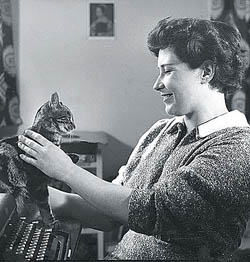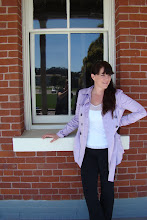With certain exceptions, I dislike books where the author has ever posed with a cat.
 |
| He who resembles Hannibal Lecter |
 |
| Lessing |
 |
| Ye Olde Windbag |
 |
| Thompson |
 |
| Cortazar |
 |
| Kerou-whack |
 |
| Twain |
 |
| Burroughs |
Anyway, I don’t usually ask about favorite books unless I’m curious about the individual. Or if someone recommends a book that I fall in love with, then I’ll ask them for recommendations later, but mostly to see if, by some miracle, our tastes match up on more than one title. Tastes are so subjective, it’s crazy to think that someone could like all the same favorite books as me – or even all the same books.
And yet…
Some books just appeal to a high percentage of everyone, even if a lot of them won’t admit it. (“Yes, I read the Da Vinci Code. SUCH bad writing. How on earth did he get published? I mean, the clichés! I almost couldn’t get through it. But it was interesting!”)
Some random answers from various conversations:
1 - Most of those books are fantasy. They involve the creation of other worlds that readers enjoy inhabiting – worlds you wish were real and that you could be a part of. So it takes a fantasy novel to make people fall in love, kind of like it takes airbrushing to make a Victoria’s Secret model….
2 - Corollary to the above: there’s something hardwired in the human brain that makes people appreciate fantasy. Witness the fact that every culture’s main artifacts are their myths, and we still listen to – and tell - and in some cases believe those stories today.
3 – Another corollary: Someone claimed that this was Tolkien’s answer, but whatever: that there’s something about the modern world that is essentially offensive to people’s souls. We live in the realm of the Lorax and we want grass and trees, so we look to novels or films to provide us with gratifying dramas set in magical landscapes with stories that involve the destruction of worlds and the desperate struggle to preserve those worlds.
4 – Each of these novels did something unique and fresh. (My personal argument here is that each of these novels did MANY things unique and fresh, as well as many things OLD AS HELL, but they did them with alchemical intelligence. And I'm not sure how much of that was even conscious. If you're following me this far, you'll understand when I say I want to write a book called "Breaking Dawn: or When the Author Accidentally Shows that They Had No Idea What They Were Actually Doing." And one for screenwriters called: "Lost.")
5 – Each of these writers was slightly mad and had a gripping, all-consuming passion for their art. And everybody knows that tortured artists are better. (When they're dead.) Which I think is not even remotely true.
 |
| there has to be a key! |
7 – Sheer dumb luck
8 – Voodoo
9 – A conspiracy of dumb readers, peasants with disposable income who could never be expected to appreciate the true genius of David Foster Wallace, David Mitchell or ye, any author named David (apologies to Sedaris). You know, those authors who say “screw you!” to basic ideas of, I don’t know, plot and character. If more readers appreciated this kind of butt-crack-of-the-bell-curve fiction then there wouldn’t be enough space left for books like Twilight to infect the planet.
(I think, as punishment for their vanity, all the Butt-Cracks who make this argument should be forced to sign their favorite authors’ books at Walmart in hell for however long it took each dissatisfied reader to grapple their way through the tedious fiction.)
10 – I’m sure I left something out.
I think the whole idea of a mystery series is that it's the long road to this phenomenon. For example: Lee Child, Sue Grafton, Janet Evanovitch. It’s like, if you write enough pages about this guy, or that girl, or this small town, then eventually you will have a full-scale fantasy novel on your hands – an utterly complete world that someone can slip into and stay in for years and know every nook and cranny of. One Lee Child book is fun, twenty is...hell, by then you’ve developed a frickin relationship with Reacher.
You know how there are 5 or 6 flavor receptors on the tongue? Well, I feel like there 5 or 6 taste receptors in the storytelling brain, and apparently fantasy is a big one. Sometimes you taste the finest thing in the world, but if you have too much of it.... You people who are into zombie romance right now, you're like the Big Gulp gang of the literary world. You need to stop.
Let’s say some of the above ten commandments are true. Then I want to know: What is it about people that makes them like fantasy so much? What is it about fantasy that appeals to people so much? What about all the great fantasy novels that DON'T get big? What are they failing to do, if anything? What sins have they committed? What vanities? What ignorance? Can someone answer that?
Good lord, this is long.
And where is sci-fi in all of this? Why, the movies and TV. Star Wars, Star Trek, Avatar, the Matrix.
Anyway, I’ve been sneaky. I’ve just told some favorite books and movies, except my favoritest of all, the answer of which is embedded in here in the most un-subtle way, if you care to notice. (How much do you really want it??? Ahh see, you don’t. More proof of the Zen mantra that I just invented: asking questions is a cheap man’s way of finding answers. Next time someone asks me what my favorite book is, I’m going to say paper.)
 |
| i said there were exceptions |












